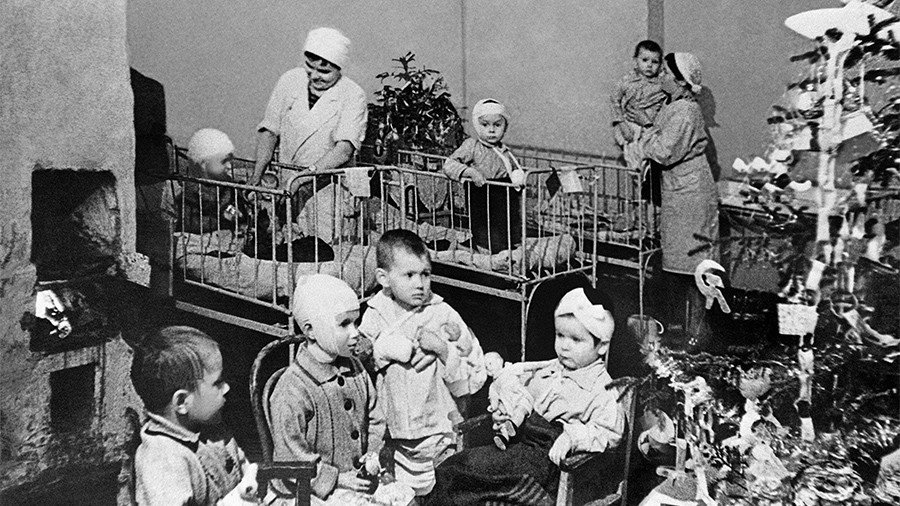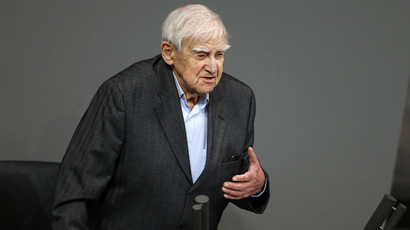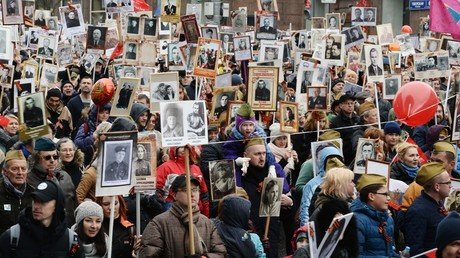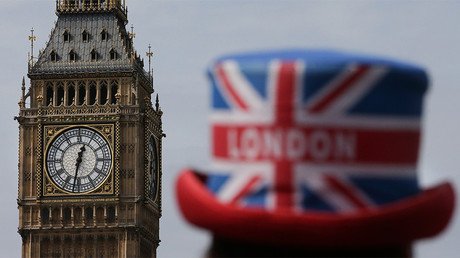'We slept as there was nothing to eat': Stories of New Year celebrations during Siege of Leningrad

Ahead of the Victory Day – a very personal day for many in Russia and beyond – RT shares recollections of people who lived, struggled and had little joys in their childhood tragically taken away during the Siege of Leningrad.
The horrific Siege of Leningrad was one of the most lethal in world history, and lasted for 872 days, from September 1941 to January 1944. The city's civilian population of almost three million refused to surrender or flee in panic, even though they were completely surrounded by advancing German forces.
Here, we tell you four stories of the time, the stories of people who had to endure enormous suffering as they were trapped in Leningrad – the country's second-largest city in which starvation and hunger were as deadly as German bombs and shells.
"It was June, we were at our dacha, and then my father appeared with a changed look on his face, and said: 'It's war,'" Valery Voskoboinikov, the 79-year-old siege survivor, told RT. He said he initially liked the word 'war', but his father gave him a little slap to stop the son joking around, then packed immediately and left.
The Germans quickly broke through Soviet defenses in the area and surrounded the populous city. Hitler's plans for Leningrad, set out in the Operation Barbarossa strategy, meant that all residents would gradually die out due to famine or succumb to illnesses or bomb injuries. By the first winter of 1942 there was no heating, no water supply, almost no electricity and very little food.
Nevertheless, despite all major supply lines – with the exception of the famous 'Road of Life' running across the ice of Lake Ladoga – having been cut by the Germans, some New Year celebrations were set up. These were to strengthen the people's morale and demonstrate that Leningraders were resilient enough to carry on.
"We had a New Year celebration at our kindergarten," the 79-year-old Voskoboinikov recalls. "They sat us on benches and gave each of us a mandarin – an amazing fruit I hadn't eaten before."
READ MORE: True blood sacrifice: How starving donors helped end Nazi siege of Leningrad 75 years ago
He recalls that the very fruit that he had eaten on that cold day in 1942 had a hole in it and he later learnt "it wasn't just a hole, but a hole from a Nazi bullet."
For other families, the New Year was all about sleeping – because food was unavailable. "Today is a New Year. What it has in store for us is a mystery," reads a note by 16-year-old Borya Kapranov. "This is the first time we have celebrated the New Year like this."
The boy adds that "instead of having fun around the Christmas tree, we were sleeping because there was nothing to eat."
Tonya Zhurina, 15, was given a ticket to the theater, but the play was interrupted several times because of bomb alerts. "The performance was stopped, and we went to the bomb shelter," she wrote. "After the play, the tables were set."
Everyone there was given a small cutlet with buckwheat – a pure luxury in the besieged city, where the only food available from the authorities was 125 grams of bread per day, a slice the size of a standard box of matches.
But for Galina Zimnitskaya, aged 14, the New Year was about a small wonder. "In a few hours, the New Year will be here. After a hot water with a slice of bread, everyone in our household went to their rooms," her note reads.
Lying in bed, the starving girl was remembering how the New Year was celebrated before the war with chocolate as tree decorations and toys. And then she remembered that some of chocolate was kept among Christmas decorations.
"And I realised that this treasure is lying in a box with some toys! Screaming 'Hooray!' I jumped out of bed, turned on the lamp, dragged the box from the cupboard and got the precious sweets! All fifteen of them!"
Any food was bringing joy to homes in Leningrad. "I had a good New Year," Vladimir Fokin, a factory worker, wrote. "Polina baked flat bread out of potato peelings. I brought wood glue, and we cooked jelly from it."
In the evening, he continues, they went to the theater, but it was uncomfortable. "It was just as cold inside as it was outside, and the audience was covered in frost. The temperature was minus 35 degrees."
Somehow, the city survived, and its heroic 872-day resistance ended in 1944, becoming the symbol of unparalleled resilience and determination. But the lifting of the blockade came too late for many, as it took the lives of at 1.5 million people.
"Hitler ordered [his troops] not to enter the city to avoid losses in street battles, where tanks were unable to take part. German troops, in fact, quite comfortably and easily, expected that the coming famine and cold would force the city to surrender," writer Daniil Granin told members of the German parliament back in 2014.
Despite colossal casualties and losses of territory, the Soviet troops were able to hold out against the German army. After the crushing defeat at Stalingrad in 1943 came a number of other victories, spurring the Soviet drive towards Berlin which finally fell in May 1945.
The number of Soviet deaths accounted for almost a half of all WWII casualties. The largest country on the planet lost about 27 million people, both soldiers and civilians. The memory of the war is particularly venerated in Russia where May 9 has become a national holiday – Victory Day. It is now commemorated in a grand military parade on Red Square in Moscow and in Russia's other major cities.
Think your friends would be interested? Share this story!















